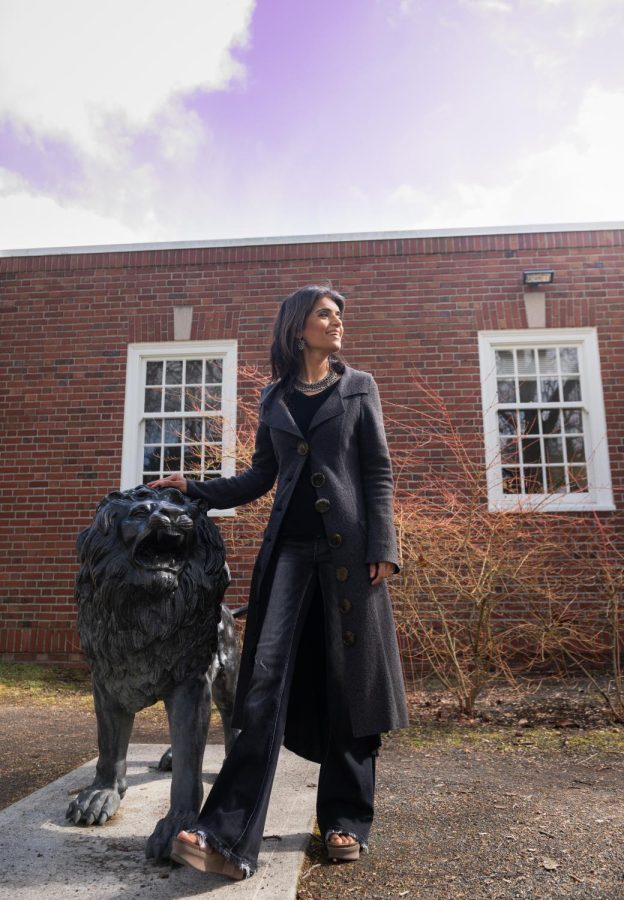“Rebellious Lawyering”: A Conversation with Professor Batra Kashyap
Monika Batra Kashyap ’92’s first day of work as an immigration attorney was on September 10, 2001. The office she worked in was two blocks from the World Trade Center in New York City. In less than 24 hours, the world turned upside down.
The U.S. immigration system, as she knew it, was forever altered. What used to be the Immigration and Naturalization Services became an institution primarily focused on defending the homeland. It also meant that “people who looked like me became the new enemy No. 1,” says Batra Kashyap. September 11 and its aftermath left a lasting impact on Batra Kashyap and her perception of the American legal system. “I saw just how quickly this country can turn on its own immigrants,” she recalls, “with a flip of a dime, anyone can be seen as a threat.”
Professor Batra Kashyap addressed an Upper School assembly in mid-March. I later had the chance to speak to her at length about her career and insights as an immigration attorney and clinical law school professor at Seattle University. Batra Kashyap’s journey as an immigration attorney began with an event that was confronting, personal, but also transformational. Representing Muslim and South Asian clients while witnessing the detrimental impacts of large-scale racial profiling and deportation, she realized two things. First, the American immigration system is rooted in a history and perpetuation of exclusion and unfairness. Second, that she wanted to be a lawyer who centers the stories of those who are marginalized.
In 2006, Batra Kashyap represented a client at the Northwest Detention Center, less than an hour’s drive from Seattle. The detention center was prison-like: stale air, people cuffed on the wrists and ankles, and lockdowns that occurred every two hours. The individuals who were detained were not addressed by name but were kept track of by the colors on their assigned clothes.
“Throughout the two years I represented my client,” recalls Batra Kashyap, “I saw her progressively lose more and more of her humanity as her mental health also deteriorated.” It was difficult for the attorney, both physically when she walked through the space and emotionally as she watched her client sustain such an environment, week after week, month after month. “The sounds, the smells… everything about that environment was incredibly oppressive.” After a long moment of silence, she reflects, “I bore witness to inhumanity that I didn’t know this country was capable of.”
This experience further strengthened Batra Kashyap’s determination to be what she describes as a “rebellious lawyer” — someone who disrupts the status quo in order to center the stories of the most marginalized and create social change. “I felt both very disappointed in our legal system and privileged to be in a position of power” as an attorney, she explains, “I was invigorated to affect change within the system.”
Batra Kashyap worked as a removal defense attorney in Washington state. For two years, she represented people from the Northwest Detention Center, defending immigrants from deportation. In a somber turn of events, she was diagnosed with non-Hodgkin’s lymphoma, a type of cancer, that traced back to September 11 contaminants. After she recovered from several surgeries and chemotherapy treatments, she was hired by Seattle University of Law as a clinical law professor, teaching students interested in practicing immigration law. She supervised students and acted as the lead representative as they worked to represent immigrant asylum seekers and survivors of gender violence.
With a smaller caseload than when she worked at a law firm, and with the classroom space to have discussions with her students, Batra Kashyap found the space to reflect. “I began really thinking about how I want to practice immigration law, how I wanted to engage with clients, and how I can help the next generations of immigration lawyers approach their practice of law,” she recalls. “I was hooked, so I stayed at Seattle University for the next 15 years.”
Currently, Batra Kashyap continues to advocate for social justice. Most recently, she analyzed the disproportionate impacts of the COVID-19 pandemic on Black, indigenous, Latinx, and AAPI communities. However, simply recognizing inequality is not enough. In this present age of intensified domestic tensions and global instabilities, she gives us advice: “Times of crisis — a war, an economic recession, or a pandemic — reveal who is prioritized and valued by society; strive to understand who is centered, whose harm is made invisible, and why.”
Hallie X ‘23 has spent much of her time over the past three years contributing to Tatler’s collection, amassing over 20 articles in total. She covers...

